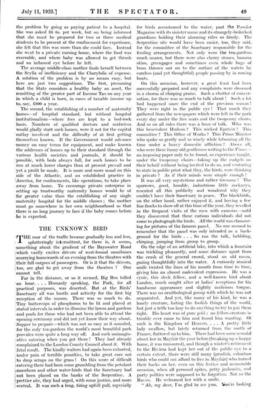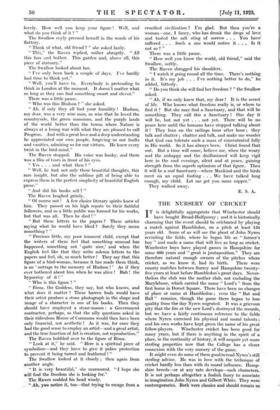THE UNKNOWN BIRD
rill-1E roar of the traffic became gradually less and less, r -I-- splutteringly intermittent, for there is, it seems, (something about the gradient of the Bayswater Road 'which vastly excites drivers of west-bound omnibuses scurrying homewards of an evening from the theatres with ;their full cargoes of passengers. Or is it that the drivers, I too, are glad to get away from the theatres ? One ,cannot tell.
Far in the distance, or so it seemed, Big Ben tolled 'an hour. . . . Humanly speaking, the Park, for all practical purposes, was deserted. But at the Birds' Sanctuary all was bustle and activity for the first big ;reception of the season. There was so much to do. ,' Tiny buttercups of phosphorus to be lit and placed at stated intervals in order to illumine the lawns and gardens and pools for those who had not been able to attend the opening ceremony and did not yet know their way about. Supper to prepare—which was not so easy as it sounded, for the only tea-gardens the world's most beautiful park provides were quite a long way off. And such unimagin- ative catering when you got there ! They had already complained to the London County Council about it. With fatal result. The kindly waiters had again been exhorted, Under pain of terrible penalties, to take great care not to drop scraps on the grass ! On this score of difficult catering there had been some grumbling from the petulant moorhens and other water-birds that the Sanctuary had not been placed on the banks of the Serpentine. A prettier site, they had urged, with some justice, and more central. It was such a long, tiring uphill pull, especially for birds accustomed to the water, past the Powder Magazine with its sinister name and its strangely-bedecked guardians holding their alarming rifles so firmly. The Serpentine site would have been easier, too, they said, for the committee of the Sanctuary responsible for the feeding arrangements. Not only were the tea-gardens much nearer, but there were also cherry stones, banana skins, greengages and sometimes even whole bags of buns thrown out on to the surface of the waters by careless (and yet thoughtful) people passing by in rowing boats.
On this occasion, however, a great feast had been successfully prepared and any complaints were drowned in a chorus of chirping praise. Such a chatter of conver- sation, for there was so much to talk about ! Such a lot had happened since the end of the previous season !
They were right in the public eye ! That much they gathered from the newspapers which were left in the park every day under the free seats and the twopenny chairs.
And so on all sides there was a buzz of talk. Who was this benevolent Hudson ? This wicked Epstein ? This committee ? This Office of Works ? This Prime Minister who spoke so gently and so wisely while labouring all the time under a heavy domestic affliction ? Above all, who were these funny old gentlemen writing to the Times — an imposing paper only to be found, so experience taught, under the twopenny chairs—taking up the cudgels on their behalf without being invited to do so, and venturing to state in public print what they, the birds, were thinking in private ? As if their minds were simple enough !
It was all very mysterious and rather tiresome ! The sparrows, good, humble, industrious little cockneys, resented all this publicity and wondered why they couldn't have their Sanctuary in peace. The blackbirds, on the other hand, rather enjoyed it, and having a few fine frocks to show off at this time of the year, they revelled in the frequent visits of the men with cameras--until they discovered that these curious individuals did not come to photograph the birds. All the world was clamour- ing for pictures of .the famous panel. No one seemed to remember that the panel was only intended as a back- ground for the birds . . . So ran the talk, babbling, chirping, jumping from group to group.
On the edge of an artificial lake, into which a fountain was trickling pleasantly, and some distance apart from the crush of the general crowd, stood an old raven, gazing thoughtfully into the water. A curiously ironical smile twisted the lines of his mouth from time to time, giving him an almost malevolent expression. He was a cynic, this sleek fellow, and a well-known bird about London, much sought after at ladies' receptions for his handsome appearance and slightly malicious tongue.
There was no ornithological gossip with which he was not acquainted. And yet, like many of his kind, he was a lonely creature, hating the foolish things of the world, but just a trifle too lazy to do anything to try to put them right. His heart was of pure gold ; no fellow-creature in trouble ever came to him and found him wanting. Of such is the Kingdom of Heaven k pretty little lady swallow, but lately returned from the south of France, fluttered up to him. There had been sonic scandal about her in Mayfair the year before (breaking up a happy home, it was rumoured), and though a winter's retirement to the Riviera had kept her out of the public eye to a certain extent, there were still many (prudish, suburban birds who could not afford to live in Mayfair) who turned their backs on her, even on this festive and memorable occasion, when all personal spites, petty jealousies, and party politics were supposed to be forgotten. Not so the Raven. He welcomed her with a smile.
" Ah, my dear, I'm glad to see you. you're looking lovely. How well you keep your figure ! Well, and what do you think of it ? "
The Swallow coyly preened herself in the words of his flattery.
" Think of what, old friend ? " she asked lazily.
" This," the Raven replied, rather abruptly. " All this fuss and bother. This garden and, above all, this piece of statuary."
The Swallow looked about her.
" I've only been back a couple of days. I've hardly had time to think yet."
" Well, you'll have to. Everybody is pretending to think in London at the moment. It doesn't matter what so long as they can find something smart and clever."
There was a little pause.
" Who was this Hudson ? " she asked.
" Ah, if only they all had your humility ! Hudson, my dear, was a very wise man, so wise that he loved the countryside, the green mansions, and the purple lands of the world better than the towns where Nature is always at a losing war with what they are pleased to call Progress. And with a great love and a deep understanding he appreciated our own people, forgiving us our faults and vanities, admiring us for our virtues. He knew every twist in the bird-mind."
The Raven stopped. His voice was husky, and there was a film of tears in front of his eyes.
" Yes . . . and what then ? "
" Well, he had not only these beautiful thoughts, this rare insight, but also the sublime gift of being able to express them in the perfect simplicity of beautiful English prose."
" And did his books sell ? "
The Raven laughed grimly.
" Of course not ! A few choice literary spirits knew of him. They passed on his high repute to their faithful followers, and so a little public was formed for his works, but that was all. Then he died ! "
" But these letters to the papers ? These articles saying what he would have liked ? Surely they mean something ? "
" Precious little, my poor innocent child, except that the writers of them feel that something unusual has happened, something not ' quite nice,' and when the English feel like that they write solemn letters to the papers and feel, oh, so much better ! They say that this figure of a bird-woman, because it has made them think, is an ' outrage to the memory of Hudson ! ' As if they ever bothered about him when he was alive ! Bah ! the hypocrisy of it ! "
" Who is this figure ? "
"Rima, the Goddess, they say, but who knows, and what does it matter ? These barren fools would have their artist produce a stone photograph in the shape and image of a character in one of his books. Then they should have employed a stone-mason : a Government contractor, perhaps, so that the silly questions asked in their ridiculous House of Commons would then have been only financial, not aesthetic ! As it was, for once they had the good sense to employ an artist—and a great artist, and the true function of Art is creation, not reproduction."
The Raven hobbled over to the figure of Rima.
" Look at it," he said. " Here is a spiritual piece of symbolism—and they have to give it police protection to prevent it being tarred and feathered ! "
The Swallow looked at it closely ; then again from another angle.
" It is very beautiful," she murmured. "I hope she will find the freedom she is looking for."
The Raven nodded his head wisely.
" Ak you notice it, too—that trying to escape from a crucified civilization ? I'm glad. But then you're a woman—one, I fancy, who has drunk the dregs of love and tasted the salt sting of sorrow . . . You have suffered . . . Such a one would notice it . . . Is it not so ? "
There was a little pause.
" How well you know the world, old friend," said the Swallow, softly.
The Raven shrugged his shoulders.
" I watch it going round all the time. There's nothing in it. It's my job . . . I've nothing better to do," he, added, bitterly.
" Do you think she will find her freedom ? " the Swallow asked.
" Ah, if we only knew that, my dear ! It is the secret' of life. Who knows what freedom really is, or where to find it ? But she may find a Sanctuary, and that will be something. They call this a Sanctuary ! One day it will be, but not yet . . . not yet. There will be no peace here until the humans have stopped talking about it ! They lean on the railings hour after hour ; they talk and chatter ; chatter and talk, and make me wonder that God can tolerate such a mass of concentrated folly in His world. So it has always been. Christ found that out. But a time will come, believe me, when the weary and the unhappy and the disillusioned will keep vigil here in the cool evenings, silent and at peace, gaining strength from the superb optimism of that figure. Then it will be a real Sanctuary—where Mankind and the birds meet on an equal footing . . . We have talked long enough, my child. Let me get you some supper."
They walked away. E. S. A.



























































 Previous page
Previous page